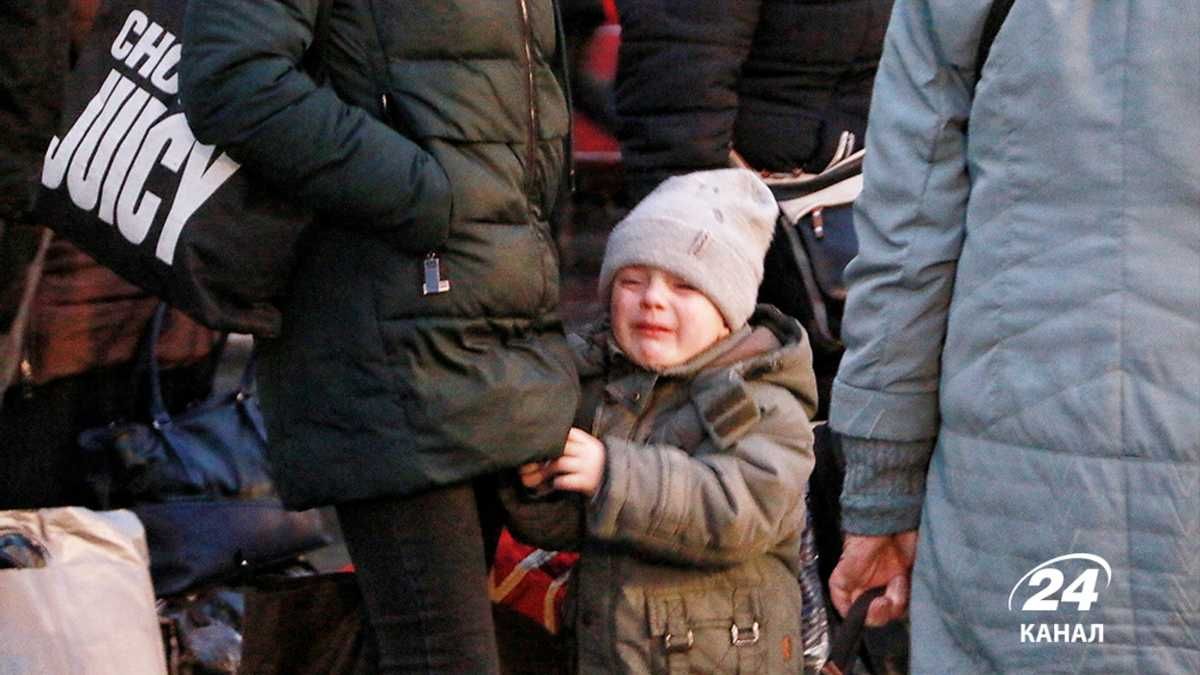We are in Lviv on February the 24th. It will take me almost two hours to calm myself and my neighbor-lady down. After a few more hours she stops being nervous, but continues asking to explain what is happening.
Read more: UN General Assembly demands Russia to withdraw troops from Ukraine
Darinka types a note and shows to me in surprise: “A friend from Sweden wrote to me asking if it’s true that we had attacked Russia".
She quickly erases it and writes about being afraid for the house in Chernihiv and her parents. All because Russia is close by.
The Basement
We are horrified closely following the news all day. There isn’t enough time to catch up with everything. After the information about the missiles from Belarus came in, we are headed to the bathroom. She opens the windows as a precaution and asks to tell her if a siren goes off. She asks to listen for her and for the cat which doesn’t stop crying all day.
Despite all the tension, Darinka is going to work. She has a new office, which is far away now. She says she’ll have to wake up early to make it on time. But on February 26 Darinka goes to weave camouflage nets.
On the third day of the war I wake her up at 6:00am. I see the news about the air-raid alarm in Volyn. I go out to make calls to my parents and start hearing a siren on the street. I run away from my computer, start knocking to the guy next doors and my neighbor. I shake Darinka's hand while showing that there’s a siren outside. We were sleeping all dressed up, so in a few minutes we run off to the basement.
The cat is nervous and frightened by the noise in the pipes. Darinka is freezing. Someone had managed to fall asleep. Nobody panics. We would return to bed in about an hour.
The second escape to the shelter we made in the evening is way more stressful. There is a woman next to us. She speaks to her son: "Look, son. This is a Molotov cocktail recipe. Acetone and gasoline". Both are calm. "Take stools! If we have to stand for 4-5 hours no one will hold out!" - a woman yells behind the wall. "Don't worry, we'll bring them next time", someone replies.
The same person immediately adds: "Don't worry! They don't have enough missiles. But small towns didn't move so that Kyiv had enough." The woman blasts off, but goes silent for a few minutes. A dog is crying.
- And I left my cat at home ...
- Oh, I left my dog because he is aggressive towards other animals.
“We will bring everything here. Let's get this done, please," the woman approaches other people in the shelter, while my cat is trying to catch a spider.
“She clearly knows something!" - someone shouts at the end of the corridor bursting into laughter.
The People
On Sunday, February the 27th, after the news about the refugees, I thought the whole city center was full of people, just like a normal weekend. However, it is absolutely calm here. Some establishments are even open. Signboards on all storefronts are about aid for refugees. A man with a weapon walks in front of us.
Despite the calm on Kopernyka street, the usual queue at the ATM is already there. Confused foreigners with suitcases are on the opposite side of the street.
At the same time, Lviv residents are heading to the Palace of Arts carrying a lot of personal belongings. The humanitarian center is located here. Cars drive up every minute. Water, clothes and food are quickly taken out of vehicles and stacked in front of the palace. There is a separate queue of people who brought packages with items for refugees.
Vasilina has just handed over her belongings. She has teamed up with her friends and neighbours to form a group.
"We listed the items people could bring. We’ve got underwear and warm clothing. Basically all the essentials and here they are. It is very difficult for us and the tension is high. There is panic, but we braced up to protect ourselves", the girl said.
Volunteers barely have enough time to collect and organize the items. Georgiy has already been on duty for three hours. He says that there were a lot of people who donated their belongings during his watch.
"They bring clothing and food. We already manage to distribute it among refugees who arrive here" Georgiy said.
A man with two huge packages ran up to Georgiy. "Hello, brother! It's my child’s clothing. There will be a couple more similar bags shortly". He left the packages and ran back to the car.
The Railway Station
A dull mixture of rain and snow is pouring from the sky. The next tram to the railway station arrives in half an hour. We are walking in silence. The air is thick and almost electrified.
It is silent on Stepan Bandera street on the way to the train station. We decide to wait for the public transport. A woman with two kids approaches the bus stop. The kids are grabbing at her pants and rubbing their teary eyes. “You know, I would have stayed if it weren’t for all this motherhood”, – she explains to someone on the phone.
Horodotska street is packed with cars, as always. Torrents of people with suitcases are flowing from the direction of the train station. It gets more crowded as we get closer. “Hot meals!”, – someone yells amidst the anxious, troubled crowd of war refugees. There are children, women, and men here. Ukrainian and Russian are not the only languages one can hear.
A female volunteer approaches a crying boy and gives him a chocolate cookie. “We are from Zaporizhzhya, we are absolutely exhausted. Poor child:, – says the woman who is holding the boy by the hand.
There is an endless stream of people exiting the train station’s building. They are pushing, carrying their suitcases, their pets, their kids, and baby strollers.
It’s hot inside the station. The camera lens gets all hazy. Despite the clutter, a few men spread some blankets and go to sleep right on the floor.
A mom in the waiting hall yanks at her kid. Pleads with them to be patient. There are other kids just in front. They are lying on the floor. They are calm. Somebody is calling someone in the crowd endlessly. Volunteers are running around and giving out directions where to find food, hot tea, and a place to stay the night.
We squeeze through the crowd to platform #2. It is packed with people. I catch myself thinking there are not hundreds of them, but thousands. Everyone is waiting for the train.
A few moments later we are approached by a lady in her 60s. “Who told you it was allowed to take pictures here? I’m gonna call the police and the Security Service on you!”. I explain that I’m a journalist, and show her my ID. The woman feels embarrassed.
“It’s so scary, you know. We just don’t know who is who anymore, and where all the saboteurs come from. We are very scared, as people keep taking pictures of us and often can’t even explain for what purpose”, – she says.
Her name is Natalya. She asks if I know the timeline for the next train heading to Poland.
“I’m here with my daughter and grandson. We are from Ternopil, you know. We are now hosting refugees in our apartment and decided to go to Poland, as we have a place to stay there”, – she says to me.
A few minutes pass and this time a man approaches us and asks what the camera is for. “Dammit, this is maddening. We have already broken some suspicious people’s phones earlier today. They were taking pictures, didn’t have any IDs. And you see there is a myriad of us, we are scared” – he says. I ask him where he is headed and he says: nowhere.
“I’m from Luhans’k oblast. I already fled once. Had lived in Poland for a year and decided: it was time to come back”, – explains the man.
We leave the train station. The public transport heading from the station is half-empty, but we decide not to use the bus or the tram. It’s calmer in the center. We get on one of the “marshrutkas” – the city’s mini-buses. The air raid siren goes off.







